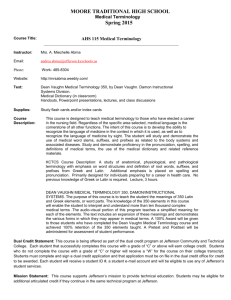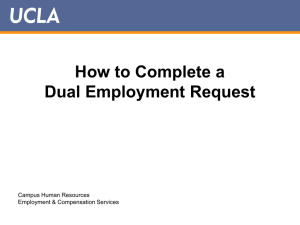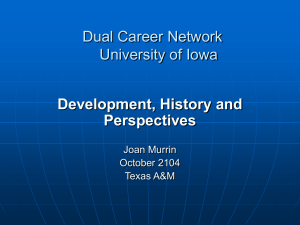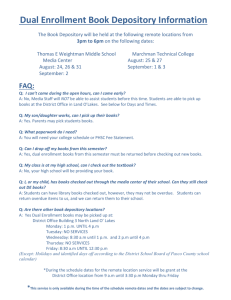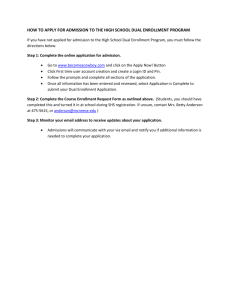Course Syllabus
advertisement
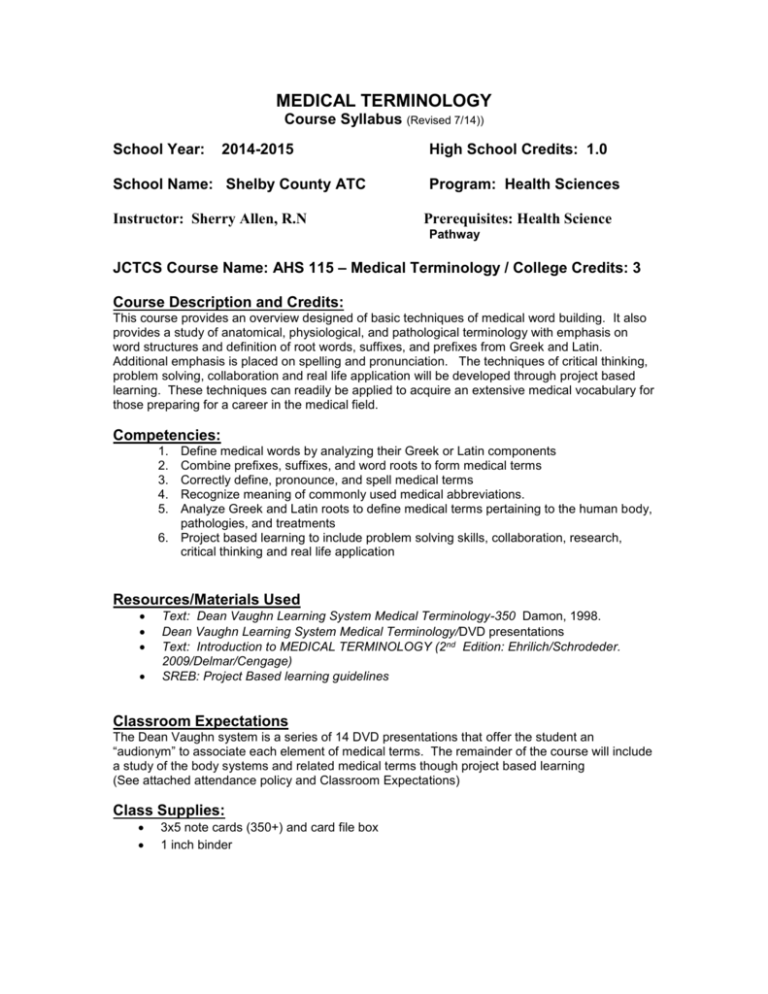
MEDICAL TERMINOLOGY Course Syllabus (Revised 7/14)) School Year: 2014-2015 School Name: Shelby County ATC Instructor: Sherry Allen, R.N High School Credits: 1.0 Program: Health Sciences Prerequisites: Health Science Pathway JCTCS Course Name: AHS 115 – Medical Terminology / College Credits: 3 Course Description and Credits: This course provides an overview designed of basic techniques of medical word building. It also provides a study of anatomical, physiological, and pathological terminology with emphasis on word structures and definition of root words, suffixes, and prefixes from Greek and Latin. Additional emphasis is placed on spelling and pronunciation. The techniques of critical thinking, problem solving, collaboration and real life application will be developed through project based learning. These techniques can readily be applied to acquire an extensive medical vocabulary for those preparing for a career in the medical field. Competencies: 1. 2. 3. 4. 5. Define medical words by analyzing their Greek or Latin components Combine prefixes, suffixes, and word roots to form medical terms Correctly define, pronounce, and spell medical terms Recognize meaning of commonly used medical abbreviations. Analyze Greek and Latin roots to define medical terms pertaining to the human body, pathologies, and treatments 6. Project based learning to include problem solving skills, collaboration, research, critical thinking and real life application Resources/Materials Used Text: Dean Vaughn Learning System Medical Terminology-350 Damon, 1998. Dean Vaughn Learning System Medical Terminology/DVD presentations Text: Introduction to MEDICAL TERMINOLOGY (2 nd Edition: Ehrilich/Schrodeder. 2009/Delmar/Cengage) SREB: Project Based learning guidelines Classroom Expectations The Dean Vaughn system is a series of 14 DVD presentations that offer the student an “audionym” to associate each element of medical terms. The remainder of the course will include a study of the body systems and related medical terms though project based learning (See attached attendance policy and Classroom Expectations) Class Supplies: 3x5 note cards (350+) and card file box 1 inch binder Assessment Plan: Shelby County ATC _ Exams/Projects - 75% Daily Work/Career Skills – 25% Grading Scale: 90-100 A 80-89 B 72-79 C 66-71 D 65-0 F NOTE: JCC Dual Credit: Must be a “C” or above in order to receive college credit Make-up Work: Attendance is critical. If you do miss class and follow class call-in procedures, you may turn in any missed work and view videos at the instructor’s discretion. It is YOUR responsibility to keep up with your make-up work. This class moves at a fast pace and if you get behind it is very difficult to catch-up. Please make every effort to attend class. Course Outline: Projects incorporated throughout course Weeks 1-18: Dean Vaughn Series Lesson 1-14 Mid-Term: Week 9: Lessons 1-7 Weeks 10-17: Lessons 8-14 Week 18: Review and Final Exam (Lessons 1-14) Weeks 19-35: Introductions to Medical Terminology: Body Systems Skeletal System Muscular System Integumentary System Cardiovascular System Blood/Lymphatic System Digestive System Urinary System Nervous System Respiratory System Endocrine System Special Senses Reproductive Systems Accommodations for Individuals with Disabilities and Equal Employment Opportunities (EEO) The Education Cabinet, the Department for Workforce Investment and the Office of Career and Technical Education does not discriminate on the basis of race, color, national origin, sex, religion, age, or disability in educational services and/or employment. The Education Cabinet provides, upon request, reasonable accommodations including auxiliary aids and services necessary to afford an individual with a disability an equal opportunity to participate in all services, programs and activities. To request materials in an alternative format, contact the Civil Rights Compliance Coordinator in OCTE or Norb Ryan at NorbJ.Ryan@ky.gov. Persons with hearing-and speech- impairments can contact the agency by sing the Kentucky Relay Service, a toll-free telecommunication device for the deaf (TDD). For voice to TDD, call 1-800—648-6057. For TDD to voice, call 1-800-648-6056. The Office of Career and Technical Education does not discriminate on the basis of race, color, national origin, sex, disability, age, marital status, or religion in admission to education programs, activities, and employment practices in accordance with Title VI of the Civil Rights Act of 1964, Title VII of the Civil Rights Act of 1964, Title IX of the Educational Amendments of 1972, Section 504 of the Rehabilitation Act of 1973 (revised 1992), and the Americans with Disabilities Act of 1990 and shall provide, upon request by a qualified disabled individual, reasonable accommodations including auxiliary aids and services necessary to afford individuals with a disability an equal opportunity to participate. Jefferson Community and Technical College System Dual Credit Guidelines Dual Credit Statement This course is being offered as part of the dual credit program at Jefferson Community and Technical College. Each student that successfully completes this course with a grade of “C” or above will earn college credit. Students must complete and sign a dual credit application and that application must be on file in the dual credit office for credit to be awarded. Each student will receive a college ID card, a student e-mail account and will be eligible to use any of Jefferson’s student services. Even if the student does not enroll for dual credit, he or she may be eligible for articulated credit if they attend college at Jefferson. Mission Statement This course supports Jefferson’s mission to provide technical education. Disabilities Statement Dual credit students with an Individual Education Plan in place are expected to follow that plan as outlined while at their high school. Protocol for Student Complaints Dual credit students that have an issue with the grade they receive are to first discuss the issue with their instructor, then the principal at their school, then the Director of Dual Credit, Kitty Zachery, JEC 217, DT campus, 502-213-2443, Kitty.Zachery@KCTCS.edu. Non-Discrimination Statement Jefferson Community and Technical College is an Equal Opportunity Institution. The colleges of the Kentucky Community and Technical College System are committed to providing educational opportunities to all qualified students regardless of economic or social status, beliefs, sexual orientation, age, national origin, or physical or mental disability. Plagiarism and Cheating Policies Plagiarism Plagiarism is the act of presenting ideas, words, or organization of a source, published or not, as if they were one’s own. All quoted material must be in quotation marks, and all paraphrases, quotations, significant ideas, and organization must be acknowledged by some form of documentation acceptable to the instructor for the course. Cheating Cheating includes buying, stealing, or otherwise obtaining unauthorized copies of examinations or assignments for the purpose of improving one’s academic standing. During examinations or inclass work, cheating includes having unauthorized information, and/or referring to unauthorized notes or other written or electronic information. In addition, copying from others, either during examinations or in the preparation of homework assignments, is a form of cheating. For more information, contact Mr. William Denton, Office of Career and Technical Education, 20th Floor CPT, Frankfort, Kentucky 40601, (502) 564-4286. Mr. Denton can also be reached through his e-mail address: WilliamJ.Denton@ky.gov. _______________________________________________________ ________________ Student Signature Date Parent/Guardian Signature Date Your signature indicates that you have read the entire course syllabus and agree to abide by both Shelby County ATC and JCTCS guidelines.
